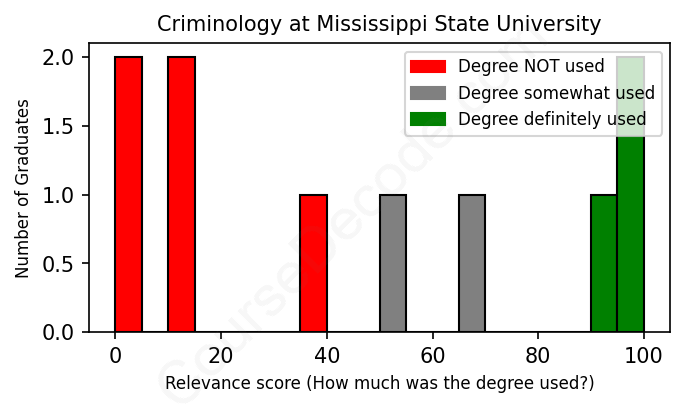
First, some facts. Of the Criminology graduates from Mississippi State University we've analyzed , here's how many have used (or NOT used) their degree in their career:

These are estimates based on AI analysis of 10 LinkedIn profiles (see below).
The verdict? Bad. Overall, with an average relevance score of 46%, Criminology graduates from Mississippi State University have a substantially lower likelihood (-21%) of finding work in this field compared to the average graduate across all fields:
And for comparison, here's the chart for all profiles we've looked at across all degrees.
Also, after graduating, 70% of these graduates have pursued further education other than another Bachelor's degree (such as a Masters degree or other), compared to the average across all profiles of 35%. This suggests you may need more than just a Bachelors degree to be competitive as a Criminology graduate.
See the details:
|
Relevance score: 10% We think this person has NOT gone into a career related to their degree. We think this person has NOT gone into a career related to their degree.
DEGREE INFOGraduated in 2012 from Mississippi State University with a Bachelor's degree in Criminology. Also pursued further education since (see below). JOB HISTORY SINCE GRADUATIONUAS Operations Lead Avion Solutions, Inc. 2018 - 2022 UAS Operations Manager  Versa Integrity Group, Inc. 2022 - 2023 FURTHER DEGREES DONE SINCE GRADUATINGMaster of Science - MSThe University of Tennessee at Chattanooga 2013 - 2015 Unknown degree U.S. Army Flight School 2015 - 2017 ABOUTProfessional expertise include, but are not limited to operation management, project oversight and asset tracking, FAA regulatory compliance, UAS autonomy and integration across multiple platforms, Inspection and testing based services, risk assessment and mitigation.Core competencies include: Operation and project management Instructional facilitation Manned and unmanned assets Risk analysis and mitigation Decision makingSpecialized skills / training include: Security Clearance Commercial Pilot - Rotorcraft, Instrument Private Pilot - Airplane Singe Engine Land (ASEL) UAS Remote Pilot Part 107 Certificate UH-60 A/L High Altitude Power Management (HAATS) SERE-C Graduate (High Risk) Medical Evacuation Doctrine Course Master Resilience Training Course OSHA Basic Plus |
The top 10 most common jobs done by the graduates we've analyzed (ranked most common to least) are:
When looking at the career paths of graduates from Mississippi State University with a degree in Criminology, it’s interesting to see a mix of roles, with some directly related to criminology and others that stray quite a bit from it. Common jobs include various positions in the legal field, such as attorneys and legal clerks, where the skills developed in criminology are highly applicable. For instance, roles like Associate Attorney, Judicial Law Clerk, and Legal Extern are solid matches, making good use of the knowledge about criminal law and the justice system. On the flip side, many graduates end up in jobs that are kind of a stretch, like UAS Operations roles or teaching positions that don’t really tap into any criminological skills, leaving you to wonder how the degree really comes into play in those scenarios.
Overall, while there are definitely some solid connections to the field of criminology, especially in legal roles and positions like Correctional Probation Officer, a good number of the jobs don’t really require that degree at all. It seems like a lot of folks venture into various sectors where their criminology training may not be as relevant, which could raise questions about the versatility of the degree for specific career paths. So, if you’re considering criminology, it’s worth thinking about what kind of job you actually want after graduation and whether that degree will set you up for those roles or if you might need additional qualifications or experience to get where you want to go!
Here is a visual representation of the most common words in job titles for Criminology graduates (this is across all Criminology graduates we've analyzed, not just those who went to Mississippi State University):

Looking at the career trajectories of graduates from Mississippi State University's Criminology program, it seems like a mixed bag. Many of them initially land roles that are at least somewhat related to their field, like correctional officers, legal assistants, and even positions in law enforcement such as firefighters. For example, a 2014 grad started as a Contact Representative at the U.S. Department of the Treasury and then moved on to a public service job as a firefighter, which shows some level of commitment to community service and safety. However, not all paths are directly linked to criminology; there are a few who ventured off into completely different areas, such as golf management and teaching, which might raise some eyebrows regarding the relevance of their degree.
Fast forward five to ten years, and you'll find that many of these graduates have navigated their careers into more specialized roles. Several have made their way into legal positions, such as attorneys and law clerks, while others have taken on significant responsibilities in various governmental and public service roles. It’s clear that those who focused on legal opportunities have often succeeded in establishing careers that closely align with criminology. However, not everyone appears to stick strictly to the criminology path, as some have transitioned into different industries entirely. Overall, it looks like there are solid options available, but the outcomes are varied, with some grads thriving in criminology-related fields and others exploring diverse career avenues.
Honestly, a Bachelor’s degree in Criminology at Mississippi State University can be a mixed bag in terms of difficulty. Generally speaking, it’s not one of the hardest degrees out there, but it does require a good amount of reading, critical thinking, and writing, especially when you dive into theories and research on crime and society. Some students find the coursework engaging and manageable, while others might feel overwhelmed by the analytical aspects or the emphasis on social sciences. It’s definitely helpful to have an interest in the subject, and if you stay organized and committed, you should be able to handle it just fine! Overall, it's on the easier side compared to some more technical majors, but it still calls for dedication and effort.
Most commonly, in the LinkedIn profiles we've looked at, it takes people 4 years to finish a Bachelor degree in Criminology.
Looking at these Criminology grads from Mississippi State University, it seems like they’re making a decent living overall, but it totally varies from person to person. For instance, some folks like the UAS Operations Lead and the Air Force officer probably have pretty good salaries since those roles are more specialized and in-demand. On the flip side, positions like the firefighter and the correctional probation officer might not break the bank as much, depending on seniority and location. The people who have shifted into law-related roles also seem to be on a promising path, considering associates at law firms generally earn good wages after some time. So, if you’re looking to jump into criminology, just know that job options can lead to different paychecks based on what direction you take!
Here is a visual representation of the most common words seen in the "about" section of LinkedIn profiles who have a Bachelor degree in Criminology (this is across all Criminology graduates we've analyzed, not just those who went to Mississippi State University). This may or may not be useful:

Here are all colleges offering a Bachelor degree in Criminology (ordered by the average relevance score of their Criminology graduates, best to worst) where we have analyzed at least 10 of their graduates:
| College | Score | Count |
|---|---|---|
 California State University, Fresno California State University, Fresno
|
67 | 20 |
 George Mason University George Mason University
|
63 | 27 |
 Arizona State University Arizona State University
|
58 | 17 |
 Missouri State University Missouri State University
|
57 | 11 |
 The Ohio State University The Ohio State University
|
56 | 16 |
 Penn State University Penn State University
|
55 | 16 |
 Florida State University Florida State University
|
54 | 60 |
 West Virginia University West Virginia University
|
51 | 20 |
 University of Maryland University of Maryland
|
51 | 11 |
 John Jay College (CUNY) John Jay College (CUNY)
|
50 | 21 |
 University of South Florida University of South Florida
|
49 | 47 |
 Central Connecticut State University Central Connecticut State University
|
49 | 13 |
 University of Florida University of Florida
|
48 | 21 |
 The University of Texas at Dallas The University of Texas at Dallas
|
48 | 10 |
 Indiana University of Pennsylvania Indiana University of Pennsylvania
|
48 | 20 |
 Mississippi State University Mississippi State University
|
46 | 10 |